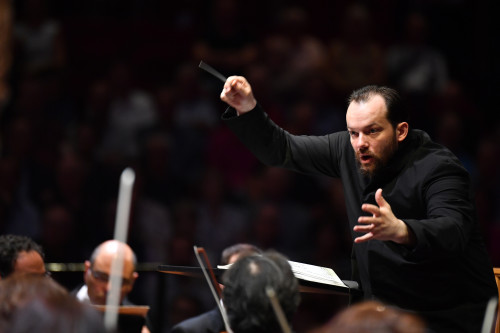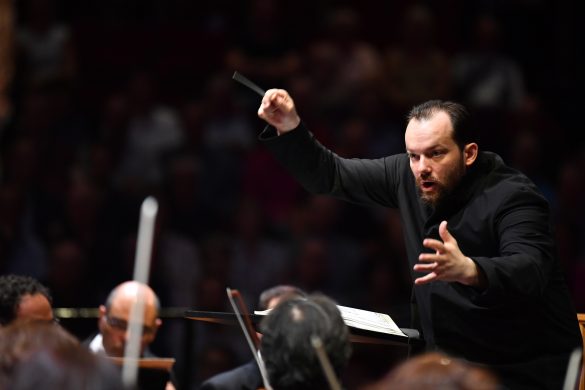
 United Kingdom Prom 69 – Bernstein, Shostakovich: Baiba Skride (violin), Boston Symphony Orchestra / Andris Nelsons (conductor). Royal Albert Hall, London, 4.9.2018. (CC)
United Kingdom Prom 69 – Bernstein, Shostakovich: Baiba Skride (violin), Boston Symphony Orchestra / Andris Nelsons (conductor). Royal Albert Hall, London, 4.9.2018. (CC)

Bernstein – Serenade (after Plato’s ‘Symposium’)
Shostakovich – Symphony No.4 in C minor, Op.43
The second of the Boston Symphony’s Proms (the first was reviewed by Jim Pritchard here) boasted an intriguing coupling and, like the Berliner Philharmoniker’s Proms. no encore. A trend seems to be developing there around visiting orchestras and a lack of encores; discuss amongst yourselves whether it is a good one …
Another trend is restless audiences, and there was again a plethora of extra-musical noise to the exposed solo violin opening of Bernstein’s magnificent Serenade after Plato’s ‘Symposium’ of 1953/4. (The BBC broadcast seems remarkably clean in comparison to what I heard in the hall; expert microphone placement, no doubt). Written for Isaac Stern, this was originally conceived as a violin concerto but blossomed into the rather rarefied idea of a philosophers’ dialogue on the nature of love. Each of the five movements centres on a different philosopher in this Platonic programme: Phaedrus, Aristophanes, Eryximachus, Agathon and Socrates, concluding with a jazz-influenced bacchanalian musical party courtesy of Alcibiades and his ‘band of drunken revellers’.
Latvian violinist Baiba Skride was a superb interpreter. The chamber scoring (the percussion comes into its own in the finale only) suits her relatively reined-in sound; she boasts a joyously sweet top. The performance highlighted Bernstein’s ability to borrow from styles in magpie-like fashion yet still sound like Bernstein. Here, it was the Richard Strauss of Der Rosenkavalier who lay behind the waltz music, for example. The highlight was arguably the Adagio (‘Agathon’) with its hushed, whispered strings, a gossamer but beshadowed lullaby to precede the somewhat Mahlerian ‘Socrates’. A wonderful duet between Skride and the BSO’s Principal Cellist, Blaise Déjardin was positively delectable; here in this finale, Bernstein mixes strict writing with jazz in the most compositionally virtuoso manner in this movement.
There was no soloist encore (in contrast to Yuja Wang’s two at the first of the Berliner Philharmoniker’s Proms, for example). This meant a relatively short first half. But that’s fine: a symphonic giant lurked in the wings.
Nelsons’ Shostakovich Fourth was an impressive affair technically. He bucked the trend of antiphonal violins, which seems to have characterised the majority of this year’s Proms, by returning to a more traditional layout, with the firsts facing the cellos. The Bostonians have fierce technical ability and a bright, alive sound (possibly a touch too bright in the strings); they are as well-drilled as they come. Nelsons’ Shostakovich with them is garnering huge critical praise; I only wish I could be quite as ecstatic about this Fourth.
This Shostakovich Symphony is a veritable behemoth, two immense movements framing a central shorter, moderato Scherzo. It needs vision, but it also needs white-hot intensity. It was not a good sign, then, that the opening of this Boston performance was remarkably well-behaved. The performance was technically staggeringly good throughout – angular oboes and bassoons so precise; a first movement fugue of astonishing virtuosity – but one had to balance that alongside some loss of character (the under-characterised violin gestures of the work’s central panel). Those who are familiar with Kondrashin in this piece might have had problems recognising the Fourth, particularly those au fait with that conductor’s spectacular 1962 Melodiya account. The schizophrenia of juxtaposing huge blocks of sound with modernist, angular gestures (themselves somewhat glossed over) was largely glossed over in Nelsons’ reading and as a result the impact was largely lost. So it was that the astonishing unanimity of the string sections in the first movement fugue was what turned the ear, not the music’s audacity.
The finale was the finest movement, coming closest to fully capturing the huge scope of the piece, its invocations of a fairground fascinating, its close spellbinding, the silence blissfully held by Nelsons (who himself remained completely still in what looked like a remarkably uncomfortable pose). And yet even then one did not emerge exhausted; somewhat exhilarated, perhaps, but certainly not wilting round the edges. Although on paper it was the Shostakovich that was the pull for this concert, it was in the event the Bernstein that was most memorable.
Colin Clarke
